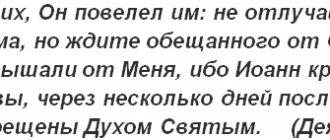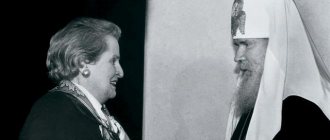There used to be a saying: “Know as the Lord's Prayer.” That is, to know something very well, by heart. This expression was based on the fact that everyone knows the main Christian prayer, the Lord’s Prayer, which was given by Jesus Christ himself. And, accordingly, “to know as “Our Father” is to know something as well as this prayer. This expression is still used by some today. The expression remains, but few know the prayer. And even fewer understand its meaning. But this is not just a prayer, it is, if you like, the “formula of happiness” for humanity. If everyone understood her and prayed to her... There would probably be no wars, no famines, no misfortunes. Lent is coming. A time when believers not only try to limit themselves in food and entertainment, read the Gospel, but also pray intensely. We invite you to remember this prayer and think about its wonderful words, full of deep meaning.
Edgar Cayce's theory
According to the mystic, we can remain healthy only when we cleanse ourselves of negativity. And this is precisely the opportunity that the Lord’s Prayer provides us with. Each atom has its own energy, which is inextricably linked with the Universe. The endocrine system plays a special role in our body. And it is destroyed by anger, hatred, envy and all negative emotions. They penetrate every cell and lead to disruption of the entire body. The necessary divine connection, which is the main source of spiritual nutrition, is lost. As a result, this situation ends in illness and failure (a physically and mentally unhealthy person cannot be fully happy).
The Healing Power of Prayer
Cayce determined that the Lord's Prayer acts like a mantra. When certain words are spoken, sounds appear that resonate with the Universe. All cells vibrate, causing them to be cleansed of everything negative.
Space is freed up for positive energy that fills the entire body. A person not only feels a surge of good emotions, he becomes healthy in both soul and body.
The effect of sacred words on the body
Now let’s look at how each phrase affects the human body.
“Our Father who art in heaven, hallowed be Thy name, Thy kingdom come, Thy will be done, both in heaven and on earth,”
These words help the thyroid gland work, it becomes active.
“Give us this day our daily bread,”
Hormonal and sexual chakras are activated.
“And forgive us our debts, as we forgive our debtors,”
words have a beneficial effect on the adrenal glands, the emotional center is activated.
“And do not lead us into temptation,”
has a positive effect (cleanses) on the Leydig cell.
“But deliver us from evil,”
cleansing occurs and the immune system is strengthened.
“Thine is the kingdom, the power and the glory, forever and ever. Amen." —
This final sentence has a beneficial effect on the thyroid gland and pituitary gland, and also cleanses the solar plexus area.
Our Father!
The Lord's Prayer begins with an appeal or invocation. This is both necessary and natural. In every conversation with anyone, in every request, we begin with the name of the person to whom we are addressing, and in important cases we also name his rank or position. And these appeals from the very first moment show the relationship of both parties to each other.
In the appeal, that basic spirit is immediately revealed and felt, with which the petition, or conversation, or letter of one to another will later be imbued. Moreover, in order to call someone with a well-known name, title, or adjective, it is necessary that the person we are addressing really be such and that we know and feel it. If it is above us, then we should be allowed to call it one way or another.
An appeal is a contraction of the relationship between two persons; it is the foundation on which all subsequent requests, conversations, and letters will stand. And therefore it is extremely important from what first word Jesus Christ taught us to pray.
The Old Russian word “Otche” is not a stepfather, it is a father. Father in the vocative case. Today there is no such case in the Russian language, only its echoes remain. Remember in Pushkin’s “Golden Fish”, the fish turns to the old man with the words: “what do you want, old man”? So the word “older”, in this case, is also in the vocative case, and in modern terms “old man”, “old man”. “Lord God, Jesus Christ” is all vocative. In modern terms - “Lord God Jesus Christ.” So, the prayer “Our Father” begins with the words “Our Father.” The Word Father should not be dead, dry, formal for us... All further prayer not only in ourselves but also in God’s relation to us depends on the first attitude of the heart.
As we are, so is God towards us: He reveals Himself to the extent of our acceptability and our attitude towards Him. Why did this happen and happen to me? This is not just a question for me, but for many people. We hardly talk about God as “Father”... Father! This means that God is close to us, like dad and mom are our parents... This means that He loves us with exceptional strength and tenderness... This means that He cares about us, just like our parents. And very briefly and powerfully: He is dear to us, and we are dear to Him...
Yes, God is the Creator, Creator, Love, Judge, Rewarder! But the most important prayer begins with the word “Father.”
If God is the Father, then we are children. Children, and not only His creations, like Angels, animals, plants, the planet, the Sun, and the entire Universe. We are not only creatures, but also children who received adoption through Jesus Christ, the Son of God, in the Sacrament of Baptism.
Are we good children? Let everyone answer this question for themselves. However, even good children not only love their father, not only expect mercy, gifts and tenderness from him, but also fear him. True, they are afraid in a completely different way than other people’s children or the guilty are afraid of the judge: they are afraid with filial fear, that is, fear of losing the love of their father. But, nevertheless, they are afraid - they are piously afraid, there is and is the fear of God. Even the angels cover their faces in fear before the majesty of the Creator.
But despite all this, children always recognize themselves as children of their father and therefore turn to him with hope and trust. Bad children also apply. Nothing prevents bad children from becoming good. With the help of the Father and personal efforts, this is possible.
“It becomes clear why we do not feel with all our souls this wonderful word of the Lord’s Prayer - “Father” - “Father.” We, perhaps, are not only not yet children, but even not yet His “slaves,” not mercenaries, but wandering away from the Father, children who have left and denied Him, living in sins with pigs.
And just as a spiritually degraded prince hides his former high origins from a noble father, so we, sinners, do not dare even within our hearts, before our own conscience, and especially before the face of the All-Seeing God, to call Him Father. This highest name makes us even more humble and bow our heads. The publican, standing at the wall of the temple, did not even dare to raise his eyes to heaven and only beat his chest and said: “God! (and not – Father!) be merciful to me, a sinner!”
But with all this fair explanation of our unworthiness, we should not and cannot forget this word - Father!
Why? Didn't the Lord know about our sinfulness when He taught His disciples this word?
Knew. And further He will openly speak in His prayer about “debts.” Jesus Christ gave this prayer to sinners. Sinners listened to Him. And yet He called God Father, teaching us to also call Him in all ages. And for this alone we do not dare to renounce this teaching: God Himself commanded so.
How can one combine the above-mentioned repentant mood with this joyful and hopeful name? Just. Quite simple. No matter how sinful we may be, God Himself always remains Love. God always remains with us in relation to the Fatherland. This is His unchangeable property - unless we voluntarily renounce Him ourselves - as happened with demons, former angels. And if we resort to Him, then He immediately turns to us on the side of the Fatherland. This is His property. This is the first reason for this word.
And the second lies in His Son Jesus Christ.
Before the Savior, humanity did not dare to call God Father, close to itself. But when the Son of God took upon Himself the sins of people and offered Himself as an atoning sacrifice for them, He thereby sought the right to call God Father, Abba (Rom. 8:15), and us - children and His “brothers” (Heb. 2:17 ; 3, 14). Thus, in this word “Father” the idea of redemption is hidden. It had not yet been accomplished when the Lord said this. But His very coming was the beginning of redemption, and He could already speak about the future as about the present. Even at the baptism of Christ, the Father said to John: “This One who is being baptized is My beloved Son, in Him (through whom) I am well pleased,” i.e. returned His fatherly favor to people. And at His birth in Bethlehem, the angels sang to the shepherds: “Glory to God in the highest... good will toward men,” of course, God’s. For the sake of the Only Begotten Son, the sonship of grace from the Heavenly Father has been restored to us. So, both in Himself and for the sake of the Son of the Redeemer, God is truly the Father. The Son of God commanded and taught this. And for this alone we are obliged and can call God Our Father. And what happiness lies in this word!..” wrote Metropolitan Veniamin (Fedchenkov).
How to read a prayer
In order to read the prayer correctly and be heard by the Lord in His mercy, you must remember that you must be as sincere as possible in your desires. Ponder every phrase, because it contains a sacred meaning. There is no need to read the prayer automatically or thinking about something else. Take this process with full responsibility. Concentrate on each word, try to pronounce them correctly. You can do this in a whisper, but be sure to do it out loud. If you suddenly make a mistake, say: “Lord, have mercy,” and continue reading further. It is best to know the prayer by heart, but at first you can read it from a piece of paper.
A student at the Vietnam Police Academy shared how she takes care of her facial skin.
The money tree pleases with lush flowering: my secret is in caring for the leaves
Lost weight: what Sofia Tarasova sacrificed for the sake of “VIA Gra” (new photos)
Words of the Lord's Prayer:
Hallowed be your name
Here is how the famous Orthodox preacher, Metropolitan Anthony (Sourozhsky) wrote about this: “Holy” - on the one hand, from the word “holy”, on the other - speaks of radiance. Now I don't confuse both words, but when we talk about a shrine, we talk about something that is full of light. “I am the light of the world” (John 8:12); you were sent as light into this world (Matt. 5:14). And it would be so easy to understand the meaning of these words if we just approached them. Namely: imagine what the reaction of each of us would be if the name of the person we most loved was used in a dirty joke or in some disparaging way; what indignation there would be in us and, moreover, what unbearable pain there would be, that the name of my mother is used like that, the name of my Motherland is used like that, the name of what is a shrine for me is used like that. This is the whole simplicity of this petition. If God were not the most beloved for us (we cannot boast that we love God more than our parents, relatives, children), but if we loved Him at least some, we would be unbearable that the name of God should be pronounced in a context not worthy of Him... We meet this in history.
I can give you two examples. In Siberia in the old days there was a tribe (whether there is one now, I don’t know) that did not have a word for God, because they believed that He could not be named, that He was too holy a Being to be given an earthly name. And they were right, because only God incarnate could receive the earthly name Jesus. And when they wanted to designate God in a conversation, they paused and raised their hand to the sky, indicating that they were talking “about Him,” but they did not give Him a name.
Second: there is a wonderful passage in the writings of Maimonides, a Jewish writer of the 12th century, about the name of God. He says that in the ancient Jewish tradition the name and the creature coincided. The real name is not a nickname, like Peter, Ivan, or a surname, but a real name - the very name that God pronounced when He called each of us from oblivion - coincides with a person or with a given creature, and therefore one cannot pronounce the name of God even in public worship, because not everyone can bear this burden or bow properly before this shrine. And Maimonides says that when the people gathered in the temple, when the prayers rose, when the singing of psalms sounded and thundered in the temple, the High Priest, who alone knew how to pronounce these four letters of the name of God (YHWH - they could be read only if you knew which vowels give life to this word, and only the High Priest knew this then), he bent down and quietly pronounced this name, and it, says Maimonides, like blood, ran through all this prayer, and the prayer, which was like a dead body, suddenly came to life and ascended to God.
This is the feeling that is dictated by the Jewish sense of the name of God and which we can understand from these examples; This is what the name of a dear person is. But having learned what it means to cherish and protect the name of a loved one, we can accordingly learn - and learn throughout our lives - to treat the name of God with precisely such a feeling that it is sacred and that we can say “God”, say “Jesus”, say “Lord” this is not just a nickname to say: this is a prayerful invocation that speaks about Him, just as the name of a loved one speaks about him - you cannot talk about him.
Therefore, this is what we are called to: in the full sense of the word, only the Lord Jesus Christ could pronounce the name of God with perfect purity of heart, mind, lips, will, flesh, and His entire being. We can pronounce these words in Christ, carefully, with trembling, without using too lightly such words that make demons tremble and which we revere... After all, it’s scary to think that at “the name of Jesus every knee bows” (Phil. 2:10) except us, Christian believers. John Chrysostom says somewhere that when we pronounce the name of the Savior Christ, demons leave us in horror, and we pronounce it without horror... How creepy it is and what responsibility we take on ourselves, knowing this name, because we know the name Father and we know him through the Only Begotten Son, and we know the earthly name for God: Jesus, “God saves.” We can pronounce these words, and such words are enough to make the whole world tremble - except us... “Hallowed be it” teaches us: take care of it as a shrine, it is more than an icon, it is more than the name of a loved one. We will not allow the icon to be desecrated, but we speak about God with such ease.”
Let's add from ourselves. Many of us in everyday speech often exclaim: “Oh, Lord!”, “Oh, God!” “Oh my God!”, “Lord Jesus!” Let's think, do we always say this to the point? Are we not trembling the name of God, which should be holy?
Rules for saying prayer at home
In order to get the maximum benefit from reading the prayer (to cleanse yourself and receive help from Higher powers), you need to remember some rules. Read the Lord's Prayer at least twice a day: morning and evening. It will be the right decision to read the holy words at lunch before eating. If there are icons in the house (be sure to purchase at least one, since for a believer the presence of an image of the Holy Face is of great importance).
Before you begin to create a prayer, you need to tune in to the appropriate mood. We are talking about bad thoughts and desires. For example, you should not ask the Lord for material help, since He himself sees all your needs and knows how to help you correctly. There is no need to wish someone harm or try to take revenge; all these actions will lead solely to an increase in the sins of the person praying.
"Dad is offended." Agata Muceniece about her relationship with Priluchny after the divorce
It’s good to wash often: myths about shampoo and hair care that only harm
Women's jeans: before you buy them, you need to pay attention to one detail
Special appeal to the Lord
Some sacred interpretations recommend reciting the Lord's Prayer forty times. Priests recommend doing this on special occasions (and not in everyday life, when reading is mandatory). You must understand that there are no specific guidelines on this matter, such a desire must be your personal one. The benefit of this reading lies in the fact that a woman needs exactly forty weeks to bear a child. The Ascension of the Lord also took place on the fortieth day after the Resurrection. Moses' encounter with God on Mount Sinai also occurred during this period. The Israelites landed on land after being on the ship precisely on the fortieth day. There are many more reasons why the number 40 is sacred.
“People hardly pray”
At the end of our article I would like to cite an excerpt from the wonderful short book of Metropolitan Veniamin (Fedchenkov): “Our Father. The Lord's Prayer."
“The reason for the daring attempt to write an interpretation of the Lord’s Prayer was an accidental circumstance. One person, even of a non-Orthodox confession (but deeply sympathetic to Holy Orthodoxy), observing the modern “Christian” society of different confessions, came to a sad and horrifying fact: people almost do not pray! The whole world is entangled in insoluble questions of various kinds. Everyone is worried and expecting even worse disasters. Everyone is looking for world node resolutions. And they almost do not pray to God for help in such great disasters... Moreover, believers of different directions, even those who profess themselves openly Christians, still seek solutions to painful questions in the same ways as non-believers of different levels, that is, with the mind, politics, war, agreements, and not prayer to the Wise. Even worse, while declaring themselves believers, people in their constant daily life either do not pray at all, or limit themselves to visiting their parish churches on certain holidays (if they still do so).
Some time has come for “empty” faith! Even if they “talk” about God, they do not pray to Him, as if He does not exist in general, and for them in particular. If before they repeated the words of the Apostle James: “Faith without works is dead,” now we have to add: “Faith without prayer is dead.” Prayer disappears from life. And such devastation of the soul led this person into a painful, terrible state: if they don’t pray, then things are bad! Looking for some kind of spiritual outlet that would correspond to the ordinary rules of an ordinary individual, this person decided to publish a book about prayer. To do this, it settled on the Lord's Prayer. The reasons are clear. Firstly, the authority of this prayer is exceptional: it was given to the world by God Himself, our Savior Jesus Christ. This means you need to pray. Secondly, this prayer is the most common among Christians. Thirdly, it is common to different Churches. And fourthly - and this is the most important thing - in this prayer the Lord pointed out to humanity the content of our prayers - how and what to pray for. No one will dare to object on this issue, for the God-Man Himself gave such and not another prayer. This is how one should pray...”
Prepared by Alexander OKONISHNIKOV, “WORD OF HONEST”
Click to support "Honestly"









